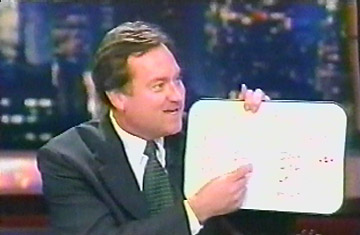
The late Meet the Press anchorman Tim Russert
If you see a woman named Kathy Frankovic appearing on CBS Tuesday evening, you might want to avert your eyes. As director of surveys at CBS News, Frankovic is the executive most responsible for declaring the network's projected winner of the presidential election. And if she gets in front of the camera, it probably means that something has gone very, very wrong. Like a Super Bowl referee, she's perfectly anonymous if she does her job right, a name in the news only if she blows the call. "We have a quite lovely studio, right near the anchor's desk," Frankovic says of her crew's setup. "There's even a camera in the room. But my goal for election night: not to be on camera."
Her colleagues at the other major networks surely have the same (lack of) ambition. News organizations are desperately trying to avoid the stumbles of 2000, when the networks botched the election by calling Florida for both Al Gore and George W. Bush, only to retract those projections. Since that debacle, the networks have faced enormous pressure to make the right pick, while still beating the competition to the airwaves. "My instructions are to make sure you get it right," says Dan Merkle, director of ABC's "Decision Desk" and the man with final say over that network's projections. "But we're obviously in the news business, and we understand the need to be timely."
(See pictures of election-night drama.)
"Projecting the winner of a presidential election," says CNN political director Sam Feist. "It's perhaps the most important thing we do in journalism. We have to be right."
Considering the record high levels of interest in this year's contest, the network that first declares the new President will find the achievement to be an even sweeter spot on its résumé. At the same time, any projection gaffe — sorry, McCain in fact lost Missouri — will be more difficult to live down. The stakes are high enough to give any seasoned election vet the jitters, and this year's expected high turnout could overwhelm the polling stations and complicate the process even more. "I'm always nervous," says Sheldon Gawiser, director of elections for NBC News, who has worked at the network for 40 years. "So many things can happen. The weather can be a mess. The computers and graphics can have a glitch. But quite frankly, I think we're really prepared. People will get mad at me for calling the primaries 'practice', but they just went on and on. We've gotten a lot of preparation from those races."
The networks have taken CIA-style precautions to insure that Election Day runs smoothly. At 11 a.m. Tuesday, three representatives from each of the six news organizations in the business of calling presidential elections — CBS, NBC, ABC, CNN, Fox News and the Associated Press — quarantine themselves at an undisclosed location to start poring over exit poll data supplied by Edison Media Research and Mitofsky International. "I can't tell you any more than that it's in the state of New York," Gawiser says of the meeting place. (Other execs confirmed that the reps indeed meet in New York City.) BlackBerrys and cell phones are confiscated and wireless technologies disabled, and minders accompany people to the bathroom. The protocols started after the 2004 presidential race, when early exit poll data indicating that John Kerry was ahead leaked across the Internet in the early afternoon. Now, the reps can't talk to their newsrooms until 5 p.m., when communication lines reopen so that the broadcast networks have enough time to prepare for their evening newscasts.
See the Top 10 campaign video moments.
See pictures of John McCain's final push on the campaign trail.
